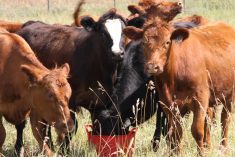ALDERSYDE, Alta. – Going organic just felt right for Tony and Penny Marshall.
The fifth generation farmers switched to organic production field by field until the transformation was complete eight years ago.
“Fundamentally, we really believed in the whole organic movement and leaving the soil better than we found it,” said Tony.
Choosing organic agriculture introduced them to a niche market where they add value to every crop grown at their Highwood Crossing Farm.
They have been forced to buy grain and oilseeds from other organic farmers to keep up with the demand. Tony is so busy with marketing that the farm is custom worked.
Read Also

The Western Producer Livestock Report – November 6, 2025
Western Producer Livestock Report for November 6, 2025. See U.S. & Canadian hog prices, Canadian bison & lamb market data and sales insights.
While they produce a variety of organic products, the Marshalls are best known for their cold-pressed, organically grown canola and flaxseed oil.
Using a specialized oil press from Germany, the canola and flax are pressed, bottled and delivered the same week they are ordered.
Their clients include high-end Calgary restaurants, natural food grocery stores and CP hotels across Canada.
The canola crop yields between 30 and 35 percent oil that is siphoned into a sealed holding tank. The meal byproducts are ejected as pellets from a spout similar to a meat grinder. They are sold to organic livestock producers.
“We can’t keep up with the meal,” Tony said. “There’s way more demand for the meal than we can provide.”
When it is time to fill an order, Tony, Penny and their two teenagers gather in the processing shed next to the house to label, sort and fill bottles with the liquid gold oil.
“It’s quite different from any oil that is out there,” said Tony.
Besides being fresh from the farm, it contains no genetically modified genes.
Inquiries come from all over the world, including calls from major food processors looking for a GM-free oil. Unfortunately, they do not have the inventory to meet all requests.
The Marshalls’ oil has a slightly stronger flavor than refined oil typically found in grocery stores. The couple recommends the bright yellow flax oil as a butter substitute drizzled on corn on the cob, brussels sprouts or mashed potatoes.
Penny is a professional home economist who works on product development and cooking recommendations.
She has developed a whole grain cereal that does not contain wheat.
Whole wheat flour and pancake and muffin mixes are also available. The grain is stone ground at Sun Prairie Mills in Nanton, Alta., which handles organic products.
One of a kind
They sell their products at the Millarville Farmers’ Market. Throughout the summer this southern Alberta market showcases about 160 vendors who carry unique products.
Organic food sales tend to be a seasonal market with good product movement in the fall and after Christmas when people have resolved to start eating a healthier diet.
Growing organic is a learning experience.
The farm had to go three years without applying fungicides, fertilizers or pesticides before it was certified organic. It also had to put in place a soil building program.
The farm is subjected to regular tests to ensure the potable water is safe. Farm records must be kept and ready for inspection.
Productivity dropped sharply in the first few years after switching to organic production, but within four years it went up again as soil tilth improved.
The Marshalls apply composted manure at four to six tonnes per acre.
Sweet clover is plowed down as green manure for added fertility.
Wheat, rye, oats and barley are among the eight crops included in their rotation.
They grow Polish canola because those varieties have not been genetically altered. Fall-seeded canola isn’t an option because it contains a polymer not permitted under certified organic grower rules.
Cultivation is necessary to fight stinkweed and thistle. Tony has learned cultivation methods must be rotated to effectively plow out all weeds. Insects like lygus bugs have not been a real problem. Tony thinks that’s because his crops are protected by the foothills’ cool air.
Their next move is to grow buckwheat and older varieties of wheat to broaden their product line.
The farm website is www.highwoodcrossing.com.















